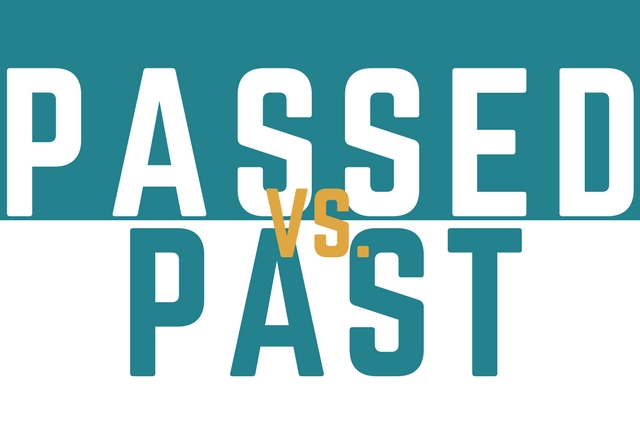
Homophones are fun, aren’t they? Unless they’re easily confused like "past" and "passed." What’s the difference? Let’s discuss these two homophones' difference and set the record straight.
The key is to understand how to use each word in sentences and learn what never happens.
Passed
Passed is the past tense verb of "to pass." Only ever use it as a verb in sentences.
- He passed the basketball to Cameron.
- We passed the Arc de Triomphe on our walk today.
Per the Oxford Dictionary, passed means:
- to move or to make something move in a particular direction: the procession passed along the road; I passed my bag through the X-ray machine.
- to go by someone or something and to continue away from he, she, or it: he passed her in the street without recognizing her; we passed the theater on the way to the station.
- to give something to someone: he passed me a message from Hugh.
- to go by (used to talk about time): the weeks have passed so slowly.
- to be successful in an exam, test, etc.: I passed my driving test last month.
- to officially approve a law: the law was passed in 2010.
Do you see how each of the above definitions uses action or movement? That’s because passed is only a verb.
Now let’s look at past.
Past
Past is more flexible in a sentence than passed, but it is never a verb. Past can function as an adjective, an adverb, a noun, and even a preposition. Let’s look at the Oxford Dictionary’s definitions and examples taken straight from their blog:
Noun
- the time before the moment of speaking or writing: that approach hasn’t worked in the past, and it won’t work today.
- the history of a place or person: she’s always refused to talk about her past.
Adjective
- gone by in time and no longer existing; belonging to an earlier time: his best days are past; let’s forget our past differences.
- happening before and leading up to the time of speaking or writing: she’s changed greatly in the past year.
Preposition
- from one side of someone or something to the other; to or on the further side of: the officer rushed past her and into the house; we drove past the villa’s gates.
- (when telling the time) later than; after: it’s past midnight, let’s go to sleep.
- further than a specific point, limit, or age: the movie took the studio’s ticket sales past the $2 billion mark.
Adverb
- so as to move from one side of something or someone to the other: she saw a car going past and then heard a bang; Cox was booked for tripping the player as he ran past.
- used to talk about time going by: a month went past and nothing changed.
Final thoughts
The key? Passed is always a verb and past is never a verb. Now let’s see how you handle these difficult sentences:
- He tried to grab my arm, but I pushed passed him.
- The big fire engine and several rescue squads have gone passed.
- Amelia past me right before the finish line.
The first two sentences have the contentious word as an adverb modifying the verbs "pushed" and "have gone." Since passed is only ever a verb, these sentences aren’t correct.
The last sentence puts past in the verb’s place, something past will never do, right?
So when you’re writing and you know you need a verb, used passed. When you want something other than a verb, use past.
Let us know in the comments below the most confusing homophones you grapple with when writing.

